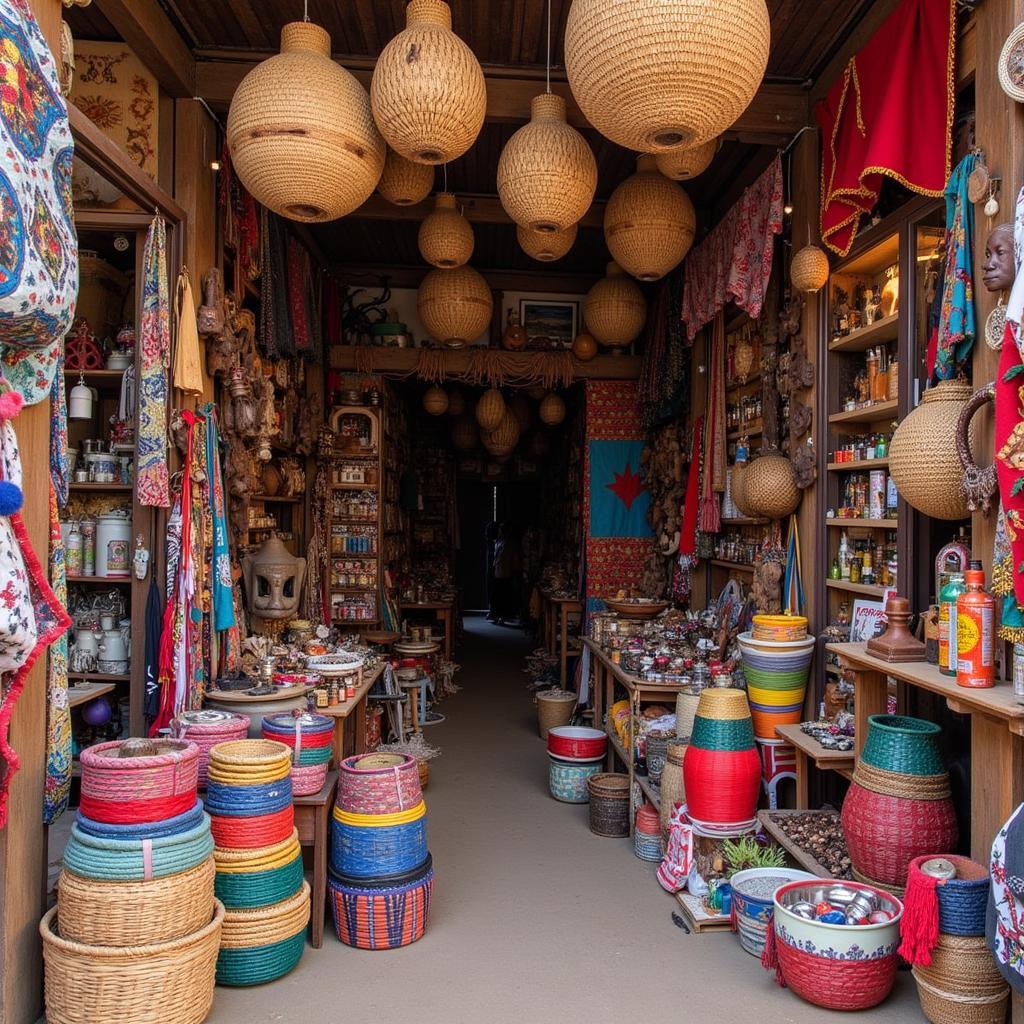Unveiling the Mysteries of African Ceremonial Masks
African Ceremonial Masks are more than just decorative objects; they are powerful symbols of culture, spirituality, and tradition, imbued with deep meaning and significance. These intricate creations serve as a vital link between the physical and spiritual realms, playing crucial roles in rituals, ceremonies, and social life across diverse African communities. Let’s delve into the captivating world of these enigmatic artifacts.
The artistry and symbolism of African ceremonial masks provide a fascinating glimpse into the rich tapestry of African cultures. From representing deities and ancestors to embodying spirits of nature and animals, these masks hold a profound significance in various ceremonies and rituals. They are not merely static objects, but rather living embodiments of cultural beliefs and values, passed down through generations. Want to learn more about African culture? Check out this resource on African culture animal.
Exploring the Diverse World of African Masks
African masks are incredibly diverse, reflecting the vast array of cultures and traditions across the continent. Each mask tells a unique story, with its form, color, and embellishments carrying specific meanings. Some masks represent ancestral spirits, while others depict animals or mythological creatures. The materials used also vary, from wood and metal to feathers and beads. The craftsmanship involved is often extraordinary, with intricate carvings and vibrant colors bringing the masks to life.
The Significance of Materials and Craftsmanship
The creation of an African ceremonial mask is a sacred process, often undertaken by skilled artisans who have inherited their knowledge and techniques from their ancestors. The choice of materials is crucial, with each material holding symbolic meaning. For instance, wood might symbolize life and growth, while metal could represent strength and permanence.
Understanding the Ritualistic Use of Masks
African ceremonial masks are not simply admired for their aesthetic qualities; they are actively used in a wide range of rituals and ceremonies. These can include initiation rites, funerals, festivals, and healing ceremonies. When worn by a dancer or performer, the mask transforms the individual into the entity it represents, allowing them to connect with the spiritual world.
Many masks, especially those representing powerful spirits, are considered sacred and are treated with great reverence. Their use is often restricted to specific individuals or groups within the community. Certain ceremonies, particularly initiation rites, can involve elaborate performances and dances where masks play a central role in conveying cultural narratives and beliefs. Looking for an African art gallery in Boston? Consider visiting this African art gallery boston.
What are the symbolic meanings behind African masks?
African masks are imbued with layers of symbolic meaning, often representing spirits, ancestors, or deities. These masks serve as a conduit to the spiritual world, mediating between the living and the dead, humans and the divine. The specific meanings vary depending on the culture and the particular mask, but common themes include power, protection, fertility, and transformation.
How are African masks used in ceremonies?
Masks are integral to various ceremonies and rituals, from initiations and funerals to harvest festivals and healing practices. They can be worn by dancers, performers, or religious leaders, transforming the wearer into the entity the mask represents. The rituals often involve music, dance, and storytelling, creating a powerful and immersive experience. Perhaps you’re looking for activities for children? This site provides information on African crafts for elementary students.
Where can I learn more about African art?
There are numerous resources available for those interested in learning more about African art. Museums, galleries, and cultural centers often host exhibitions and educational programs. Books, documentaries, and online resources offer further insights into the diverse artistic traditions of the continent. Check out this link for information on African Cameroonian culture.
The Enduring Legacy of African Ceremonial Masks
African ceremonial masks continue to hold a powerful presence in contemporary art and culture. Their influence can be seen in various art forms, from painting and sculpture to fashion and design. These masks not only serve as a reminder of Africa’s rich artistic heritage but also inspire new forms of creative expression. Want to know more about the African Tulip tree? Check out this informative article: African tulip.
In conclusion, African ceremonial masks are much more than just beautiful objects. They are powerful symbols of culture, spirituality, and tradition, offering a unique window into the rich and diverse world of African art. These masks continue to inspire and fascinate, reminding us of the enduring power of art to connect us to our past and to the spiritual realm.
FAQ
-
What are African ceremonial masks made of? African ceremonial masks are typically made of wood, but can also incorporate materials such as metal, feathers, beads, and animal hides.
-
Who makes African ceremonial masks? Skilled artisans, often inheriting their knowledge and techniques through generations, create these masks.
-
How are African ceremonial masks used? They are used in various rituals and ceremonies, including initiations, funerals, festivals, and healing ceremonies.
-
What do African ceremonial masks represent? They often represent spirits, ancestors, deities, animals, or abstract concepts, depending on the specific culture and mask.
-
Where can I see African ceremonial masks? You can find them in museums, art galleries, and cultural centers around the world, as well as in some private collections.
-
Are African ceremonial masks still used today? Yes, many communities continue to use these masks in traditional ceremonies and rituals.
Need help? Contact us 24/7: Phone: +255768904061, Email: [email protected] or visit us at Mbarali DC Mawindi, Kangaga, Tanzania.

